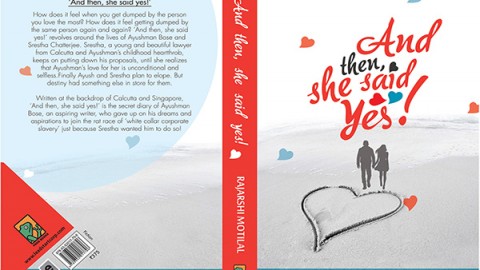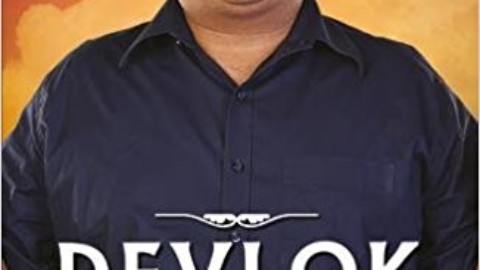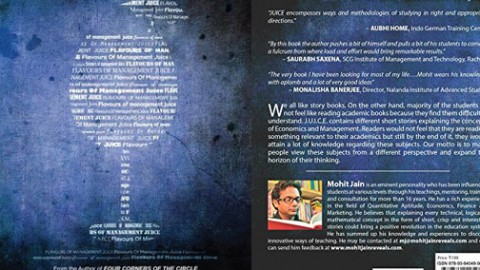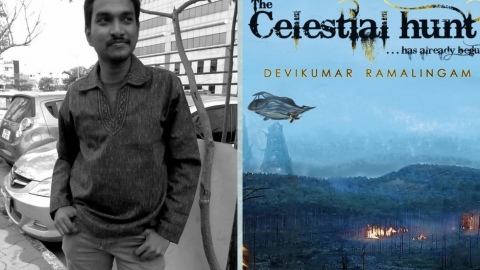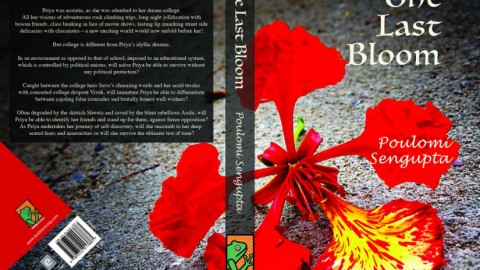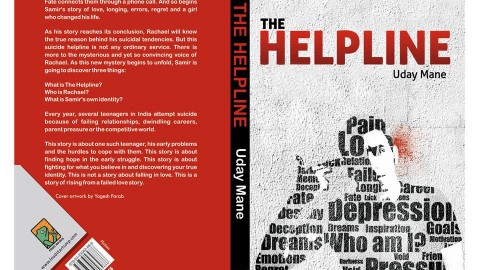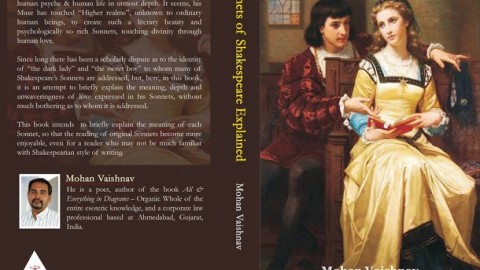During a press release that accompanied With Salt And Brine, Sharmila Ray responded, against a query about the reason behind her choice of a charred door as the cover of her book, “the door was a mirror to society which was apparently charred, but if one dared to open the door one would surely find bright colours, positivity and goodness. Positivity she believed could lie under the surface, hidden by layers of  grime, soot and sundry stains, but never absent.” In my opinion she awfully succeeded in her belief through the creation of this masterpiece that bespeaks a ray of hope in utter darkness.
grime, soot and sundry stains, but never absent.” In my opinion she awfully succeeded in her belief through the creation of this masterpiece that bespeaks a ray of hope in utter darkness.
With Salt and Brine is a slender volume that offers the readers with a kaleidoscopic view of life. It meanders through the different ways in life, leaving the readers full of positive vibes. At the first instance I found it to be the revelation of the poetess’ inner wisdom but it turned out to be the thunderous storm that could shake and break the existing panorama of the world. It’s a breathing collection of hundred verses where she has written several vignettes of different hues of life, exploring all from an individual perspective that certainly needs to be universalized.
While going through the pages one feels bound to reassess the objective behind one’s existence as she succeeds in questioning the kamikaze attitude of people where they don’t dare for a noble cause but on the contrary everyone strives to put an end to other’s existence in the name of caste, creed and color. The poetess beautifully portrays the loss of the melodious tune of Krishna in Vrindavan as everything is engulfed by the violent and asinine acts of human beings. She holds lust and greed responsible for every wrong that is committed through the Homo sapiens.
Here the poetess herself is the protagonist who wishes to produce an eternal song but feels tired of the hurly-burly of city life and gets lost on the horrendous path, witnessing the gory incidents of life. She regrets for the doomed human beings who remain confined to the inferno of violence and flesh:
You would be amazed to hear them talk
Their vocabulary limited to violence and flesh,
It’s a miracle they never got bored
Stuffing themselves with greed.
She discusses about people who are aggressive and carry no sense of admiration for a piece of literature as they are lost in the bloodbath. In that scenario “the poem becomes dumb and mute.” During the course of time she gets fed up with the bovver of people and feels like invoking sea, considering it to be an eternal source of positivity, but it appears to be a herculean task as she describes sadly, “a whiff of sea-salt breeze a distant affair.” She also blames the mechanic upbringing of parents to be responsible for the moral degradation of today’s youth as she rightly explains,
Where have the grandma stories gone-
Have they turned to glaciers in forbidden lands,
As the earth chokes on tuberculosis lungs
And the sky spews out smog?
She regrets for leading a monotonous life where each evening appears to be “a faded Xerox of the other” creating an acute sense of boredom. She also feels sorry for the loss of love and values in the melancholic world by quoting an example of mother’s recipes that have been replaced by the “anonymous cookbooks.” She sarcastically calls the Indians to be “argumentative Indians,” who view life “with a strange discourse,” leading the life of maniacs. Here she also succeeds in shaking the religious fanaticism of people when she questions them in simple but lucid manner:
What’s the point of Allah or Buddha
When Christs get crucified daily?
What’s the point of Krishna in Vrindavan
When music dies to make way for Kalashnikovs?
Through this masterpiece of Ray we come across self realization that the world can only be conquered through love and compassion as nothing remains comparable to these holy virtues. But she regrets for the loss of the pious virtue as love gets brutalized:
In fermentation, radiation and rust,
In shame, pride and muscle power,
Love got brutalized and was
Banished to a barren land.
She firmly puts forward what actually can save the world from being extinct is the prayer as the prayer carries the miraculous power to heal the wounded soul. It is the only medium through which we can pave our way to salvation.
At some point the verses turned out to be the moral lessons of life where we learn the universal truth that in this temporal world nothing is permanent but everything is subjected to death and decay. What remains omnipotent is the Time, the greatest healer that puts an end to the heartfelt miseries of life. It also equals all irrespective of their pelf and power, putting an end to their existence in the most subtle manner:
Time topples mighty empires
Death snatches young queens,
Nothing is permanent in an earthly sense,
Museum and libraries keepers of the dead.
Thus With Salt And Brine is undoubtedly an ocean of wisdom, where one gets mesmerized by the profundity of Ray’s expression. She succeeds in hypnotizing the noggins of the no-hopers with great éclat for a noble cause and warn them not to dilly dally about the profound matters of life. The book takes the readers to an unending journey of life in the search of the light at the end of the tunnel and finally allows them to enter the enlightening world of true knowledge. In a nutshell it is a must read book that will certainly give the readers more bang for their bucks.
Book Details:
| Author: | Sharmila Ray | ||
| Publisher | Yeti Books | First Published: | 2013 |
| ISBN-13: | 9788188330256 | ISBN-10: | 8188330256 |
About the Reviewer:
Dr. Mallika Tripathi is currently working as Assoc. Professor & Head, Deptt. of Humanities at FGIET, Raebareli. She is an educationalist, freelance writer, honorary legal consultant, poetess and above all a much sought after humanitarian. She is a living inspiration believing in the values of life. Her inspirational had been a great help to umpteen people. Her recent collection of poetry I Am A Woman: An Anthology of Heartfelt Verses has been a great success. Her slogan is: “True success lurks in the nobility of head and heart.”
About the Poet:
Sharmila Ray went to Presidency College and Calcutta University where she majored in History did her Ph.D on Durga and governance and subsequently joined City College, Kolkata where she is an Associate Professor and Head of the Department of History. She writes in English and has authored six books of poetry- Earth Me And You (Granthalaya, Kolkata 1996), A Day With Rini (Poetry And Art 1998), Down Salt Water (Poets Foundation, Kolkata1999), Living Other Lives (Minerva Press, New Delhi, Mumbai, London 2004), It’s Fantasy, It’s Reality (Punaschya, Kolkata 2010) , With Salt And Brine (Yeti Publishers,Calicut 2013).She has experimented her poems with sarod (Indian string instrument) and the result is a CD- Journey Through Poetry And Music. Her poems are available in a CD- Hello . Her poems, short stories and non fictional essays have appeared in various national and international magazines and journals. For a time she looked after the column Moving Hand Writes (Cal Times, Times Of India).She also edited Poetry And Art , a journal of art and poetry (1992-1998), The Journal (2012-13) , journal of the Poetry Society of India. She was also on the board of juries for All India Poetry Competition organized by Poetry Society of India and Ministry of Human Resources, Govt. OF India. She conducted poetry workshops and resource person for translation workshops organised by the British Council Kolkata, Sahitya Akademi (National Akademi of Letters) and Poetry Society India and participated in various seminars organized by Universities and private institutions. She also curated an exhibition combining paintings and poems sponsored by Alliance Francaise, Calcutta and Indian Alluminium. Currently she is the editor of Poetry And Prose . She had been invited to International Struga Poetry Evenings, in Macedonia where she represented India and International poets meet in Kerala to share stage with Ben Okri. She has been widely anthologized and featured both in india and abroad. She has been reading her poems in various parts of the country. Her poems have been translated into Hindi, Bengali, Urdu, Slovenne, Hebrew, and Spanish. Currently she is working on a poetry manuscript and non fictional essays.



